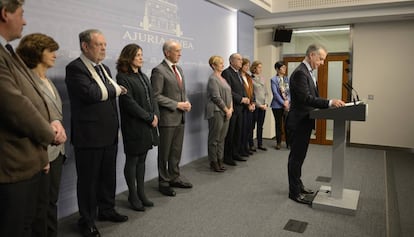Galicia, Basque Country to hold early regional elections in April
The vote will take place ahead of polls that have been announced in Catalonia, but that are yet to get an official date

The Spanish regions of Galicia and the Basque Country will both hold early elections on April 5, their leaders announced on Monday.
Both votes are taking place on the same day to spare citizens constant political campaigning, said Basque premier Iñigo Urkullu and his Galician counterpart, Alberto Núñez Feijóo.
“Galicia, just like the rest of Spain, has just been through four electoral processes in 2019 and four general elections in the last four years. It is good for Euskadi [the Basque Country] and Galicia to lead by example, as opposed to the frivolous way in which elections have been called left and right in this country,” said Núñez Feijóo, of the conservative Popular Party (PP), in a statement.
“We are sparing citizens a permanent election campaign over the next eight months, which we are reducing to just two,” added Urkullu, of the Basque Nationalist Party (PNV).
It is good for Euskadi and Galicia to lead by example, as opposed to the frivolous way in which elections have been called left and right in this countryAlberto Núñez Feijóo, Galician premier
The vote is also scheduled to take place ahead of Catalonia’s own early election, which does not yet have an official date. The Catalan premier, Quim Torra, announced the move in late January but said the election will take place after the regional budget is approved by the Catalan parliament.
Pre-election polls suggest that the coalition government between the PNV and the Basque Socialist Party (PSE) could secure renewed backing at the polls, while in Galicia, Núñez Feijóo could be on course for a fourth absolute majority. However, the most recent poll shows growing support for a three-way leftist deal between the Socialist Party (PSOE), the anti-austerity Unidas Podemos and the Galicia Nationalist Bloc (BNG).

The center-right party Ciudadanos (Citizens) on Monday sent a letter to the leaders of the PP, the PSOE and the small center party Union, Progress and Democracy (UPyD), as well as to civil society groups in Catalonia and the Basque Country, to propose a meeting. The goal of this meeting would be to explore “constitutionalist, cross-party agreements that are open to civil society” in Galicia, the Basque Country and Catalonia.
The letter says that Spain “is going through very serious times” because the country is “in the hands of populists, separatists and nationalists.” Ciudadanos is offering Prime Minister Pedro Sánchez, of the PSOE, an alliance in Galicia and the Basque Country to free the country of “the risks” of his own executive. Sánchez currently heads a coalition government with the leftist group Unidas Podemos.
The national budget
The PSOE believes that the early election in the Basque Country will also be good for the national budget, which has yet to be passed. Party sources said that once the Basque vote has been held, there will be more leeway to negotiate support from the PNV for the Spanish budget plan.
Sánchez has given himself a summer deadline to push the accounts through parliament, although success will largely hinge on a Catalan separatist party, the Catalan Republican Left (ERC), whose support in turn will depend on promised talks over the political future of the region.
As for Galicia, a PSOE victory would give the Socialists control over a region that has been traditionally dominated by the conservative PP. It would also be retaliation for the PP’s takeover of the Andalusian government following the December 2018 election in a region that had been under Socialist power for 36 straight years. That election was also the first time that the far-right Vox entered parliamentary institutions. Since then, Vox has become the third-largest force in Spain’s lower house, the Congress of Deputies.
English version by Susana Urra.
Tu suscripción se está usando en otro dispositivo
¿Quieres añadir otro usuario a tu suscripción?
Si continúas leyendo en este dispositivo, no se podrá leer en el otro.
FlechaTu suscripción se está usando en otro dispositivo y solo puedes acceder a EL PAÍS desde un dispositivo a la vez.
Si quieres compartir tu cuenta, cambia tu suscripción a la modalidad Premium, así podrás añadir otro usuario. Cada uno accederá con su propia cuenta de email, lo que os permitirá personalizar vuestra experiencia en EL PAÍS.
¿Tienes una suscripción de empresa? Accede aquí para contratar más cuentas.
En el caso de no saber quién está usando tu cuenta, te recomendamos cambiar tu contraseña aquí.
Si decides continuar compartiendo tu cuenta, este mensaje se mostrará en tu dispositivo y en el de la otra persona que está usando tu cuenta de forma indefinida, afectando a tu experiencia de lectura. Puedes consultar aquí los términos y condiciones de la suscripción digital.








































